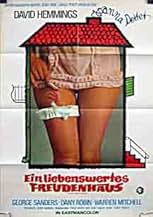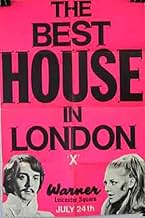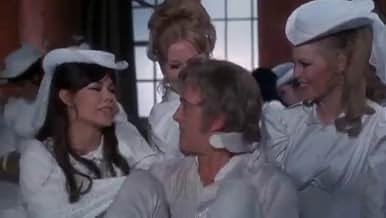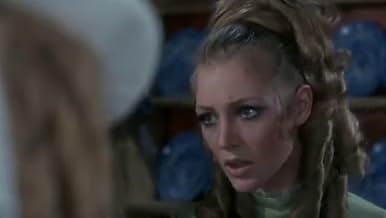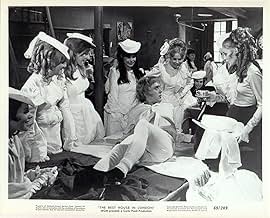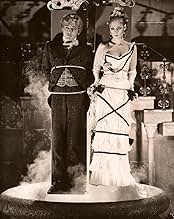In Victorian London, the British Government attempts a solution to the problem of prostitution by establishing the world's most fabulous brothel.In Victorian London, the British Government attempts a solution to the problem of prostitution by establishing the world's most fabulous brothel.In Victorian London, the British Government attempts a solution to the problem of prostitution by establishing the world's most fabulous brothel.
- Director
- Writer
- All cast & crew
- Production, box office & more at IMDbPro
Storyline
Did you know
- TriviaThe first MGM release to get an X rating from the MPAA.
- Quotes
Sir Francis Leybourne: [the Attache is sobbing] I thought you people were supposed to be inscrutable?
Chinese Trade Attache: Please, Sir Francis, China doesn't want any more opium.
Sir Francis Leybourne: Oh, do be sensible. You chaps have already lost one war with Great Britain about this.
Chinese Trade Attache: But to force us to buy it...
Sir Francis Leybourne: Well, you signed a treaty agreeing to!
Chinese Trade Attache: Your gunboats were right up our Yangtze!
Sir Francis Leybourne: No use getting hysterical, Mr Feng.
Chinese Trade Attache: Then let me appeal to our friendship; those happy weekends I used to spend at your townhouse; your late wife was always so kind to me. More than kind. She...
Sir Francis Leybourne: She was an eccentric about the inferior races. My dear fellow, I've put a lot of money into that opium plantation. Damn it, it's hard enough to get the Indians to harvest the stuff. Blasted natives! You pay them two pounds ten a year and they're useless.
Chinese Trade Attache: If you could see what the opium does to our people; they lie about the streets like dead flies.
Sir Francis Leybourne: Well, get them to use a little self-discipline, man. Self control - works wonders. Look at the English!
- ConnectionsReferenced in The Magic Garden of Stanley Sweetheart (1970)
More to the point the film illustrates the double standards of English society and its discomfort with the street variety as opposed to prostitution in general. What this further illustrates is that society is concerned more with being exposed to its double standards and how it perceives street prostitution without regard to the women involved who as the film portrays, are happy to participate in the profession. This point is illustrated in the film within context of the lack of opportunities for women to escape their impoverished lives in which there is no other options open to them.
The 'double standards' of the discomfort over street prostitution among the Victorian middle classes is illustrated via the character Josephine Pacefoot, (Joanna Pettet) who is in fact a satire of the famous Josephine Butler. Josephine Butler (1828 - 1906) was an upper middle class 19th Century philanthropic feminist who espoused the radical liberal tradition of the then Whigs as her Father did before her. Josephine Butler concerned herself with those deemed to be and as such labelled 'fallen women' giving street prostitutes a negative label by default. Butler was keen to rescue the so called 'fallen women' many of whom were criminalised via the Contagious Disease Acts of the 1860s. These acts permitted any unmarried woman to be subject to a 'virginity test'. If the woman failed the virginity test she was ostracised by society and prevented from gaining legitimate employment. This left many unmarried women vulnerable to men any of whom could request they have a virginity test for the purpose of recruiting them into prostitution if they failed and thereby trading these women. This point is illustrated in the film.
It is interesting that the 19th Century Contagious Disease Act affected women at the time of the rise of feminism in England. What The Best House In London illustrates is that feminism has a double edged sword. This double edged sword of feminism means the cause is a middle class one premised on liberation, the endeavours of which leave many poor and working class women vulnerable to exploitation, which in this film is illustrated via street prostitution. But it veers into all manner of legitimate employment as women are in most cases cheaper to employ as they're more likely of accepting lower wages that men reject.
The Best House In London is a series of sketches thread together via the issue of 'street prostitution' It seems that the original intention of the film was to reference as many as possible of the Victorian luminaries who shaped modernity and its attitudes.
For the issues it raises and the debate it permits, then The Best House In London is an interesting film produced in the style of Monty Python. In other words it's silly. It therefore illustrates that 'silly' is a positive as it exaggerates issues to express the point and as such is a clever method of comedic genre and satirical expressionism to coin a phrase.
- alexandra-25
- Apr 22, 2008
- Permalink
- How long is The Best House in London?Powered by Alexa
Details
- Runtime1 hour 45 minutes
- Aspect ratio
- 1.85 : 1
Contribute to this page


